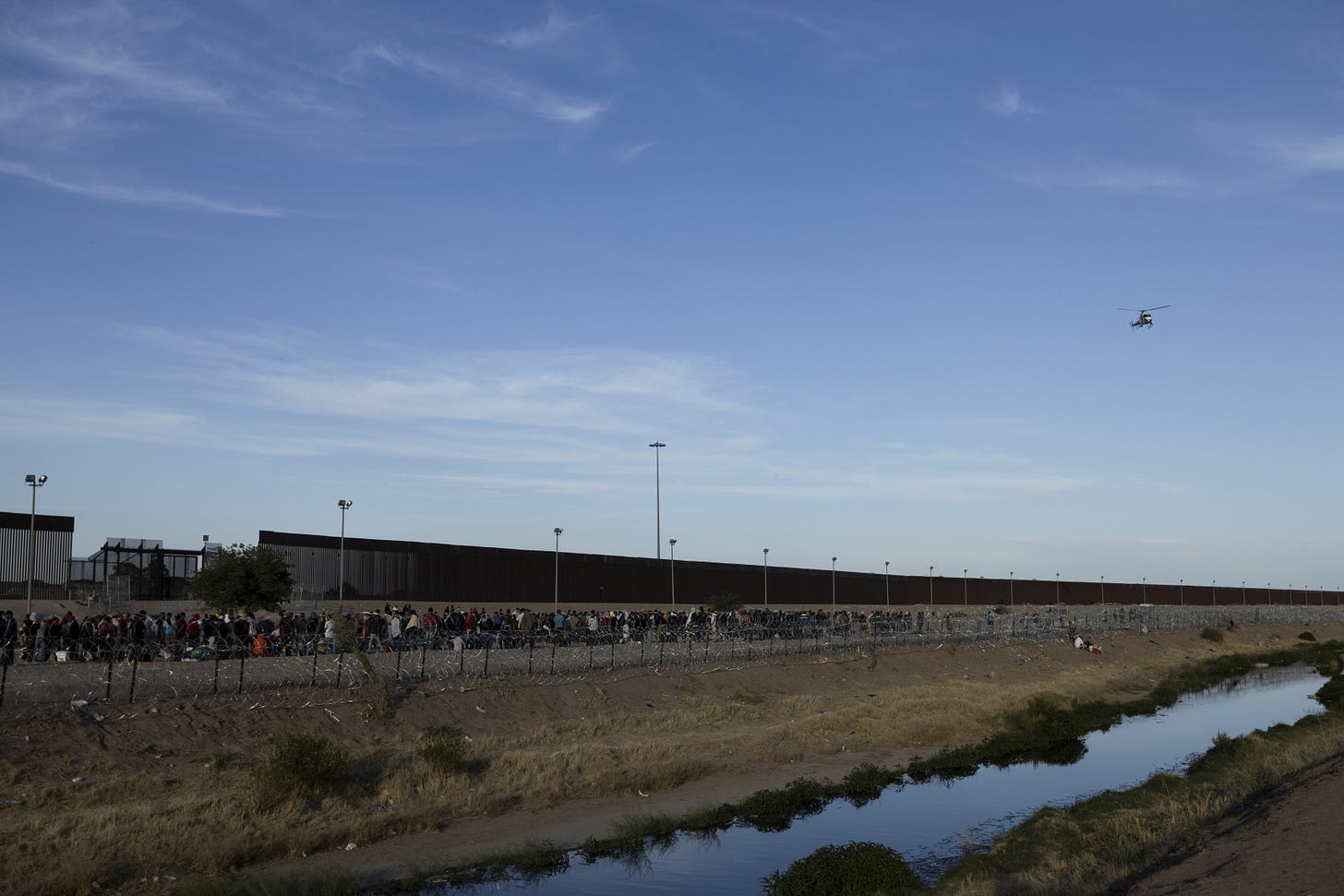TL(PM) DIGEST: Break on through (to the other side of the border)
Plus record internal displacement world wide, the economy and immigration remain top public priorities, and how Sudan shows the limits of China's financial foreign policy

1. Migrant crisis overwhelms policymakers
What happened? Title 42, the executive branch Covid-era emergency measure that allows for rapid expulsion of migrants without legal status, expires tonight. Ahead of the expected change in policy, Border Patrol agents made 10,000 arrests this Tuesday.
Why does it matter? A clear crisis is brewing at the southern border as the pandemic-era tool for dealing with large numbers of undocumented people goes away. Already overwhelmed by the surge, border patrol agents have been releasing people into border cities like El Paso while places much farther away like New York City have raised the alarm about a huge influx of people with no support mechanisms.
TLP’s take: America does not have a sane immigration system, and there are few prospects for bipartisan cooperation to create one. Although it may not be an ideal policy, Title 42 served an important purpose in keeping illegal migration in check—as evident by the gigantic surge in new migrants gathering at the border ahead of its demise with more surely to come. People clearly aren’t deterred from trying to enter America with the Biden administration’s proposed new border rules. So, as Democratic Senator Sherrod Brown of Ohio, who faces a tough political climate in 2024, puts it:
“We’re not ready. We should extend it,” Sen. Sherrod Brown (D., Ohio), who is up for re-election next year, said on Wednesday. Mr. Brown plans to sign on to a bill from Sens. Kyrsten Sinema (I., Ariz.) and Thom Tillis (R., N.C.) extending the government’s migrant-expulsion authority for two more years, an aide to Mr. Brown said.
2. 71 million people displaced by war and natural disaster in 2022
What happened? A new report by the Norwegian Refugee Council shows war and natural disaster displaced some 71.1 million people within their own countries last year—a twenty percent rise from 2021. The war in Ukraine and floods in Pakistan were the two main drivers of what the relief organization’s head calls “displacement on a scale never seen before,” and three-quarters of this total population lives in just ten countries, with Syria, Ukraine, and the Democratic Republic of the Congo hosting the largest populations.
Why does it matter? Ongoing fighting in Sudan will undoubtedly drive this figure even higher this year, further straining international efforts to provide help to those displaced within their own countries. Taken together, the internally displaced amount to a population roughly equivalent to France or the United Kingdom.
TLP’s take: Displacement due to natural disasters—hurricanes, earthquakes, floods—is one thing, and displacement due to conflict is another. It’s clear the United States and the world can do more to respond to the former and do it more effectively, but the latter has proven far more intractable.
3. Americans overwhelmingly want the White House to focus on the U.S. economy—with immigration top of second tier issues.
What happened? New research from Ipsos finds Americans placing an overwhelming priority on the economy (51 percent most important issue), with immigration (20 percent) and uniting the country (18 percent) topping the next tier of priorities.
Why does it matter? Although the public is clear about its priorities, they are not too sure President Biden is doing a good job on these issues: roughly 6 in 10 Americans disapprove of the way Biden is handling both the U.S. economy and immigration.
TLP’s take: Events quickly overwhelm politics. With the debt ceiling standoff unresolved and another migrant crisis brewing on the southern border, these next few weeks will be critical for President Biden’s positioning with the public on its two most important priorities. But thinking as Americans rather than partisans, we should all root for the Biden team to succeed—and to do what is right on both fronts to ensure that the economy does not collapse from a default and that our cities are not overwhelmed with new migrants that have no support.
4. Sudan’s conflict shows the weaknesses of China’s financial foreign policy
What happened? The Financial Times reports that the ongoing power struggle in Sudan puts at least $5 billion in Chinese loans to the country at risk, plus potentially billions more in Chinese prepayments for Sudanese oil exports. Sudan received $15.5 billion in loans from Chinese state-owned entities in the decade of the 2010s—the height of Beijing’s lending to Africa.
Why does it matter? Chinese loans are going bad all across Africa, throwing Beijing’s strategy for making friends and winning influence on the continent into question:
Beijing’s debt tribulations in Sudan are repeated across much of Africa, where Chinese state-owned lenders are suffering a series of defaults. This represents a significant shift from the mood seven years ago, when China’s president, Xi Jinping, referred to Africa as “the fastest growing and most promising continent in the world”.
Almost 80 per cent of total lending to Africa by Chinese state entities is to countries in financial distress, according to a recent paper published by the National Bureau of Economic Research.
TLP’s take: Beijing’s financial troubles in Sudan and Africa more generally show the limits of foreign aid and lending as a way to make friends and influence people. It’s far from clear how these bad loans will play out for Beijing in the long run, but it’s possible they’ll backfire by alienating African nations now in hock to an unforgiving lender.
Just one more thing…
An Australian labradoodle named Charlie warned his family of a neighborhood fire in Clovis, California and helped bring the local fire department to the scene just in time to save a number of human and canine lives.








